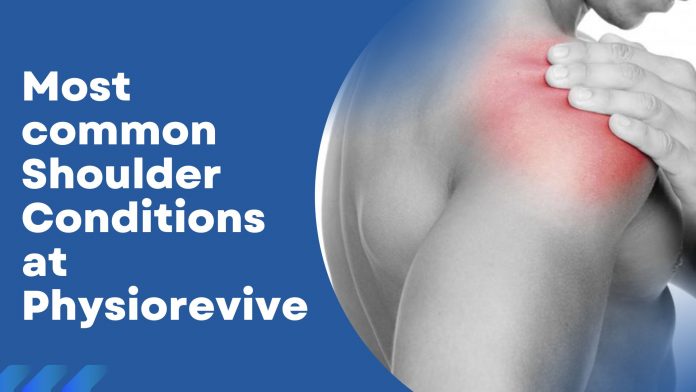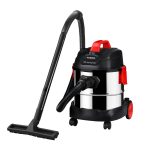Last Updated on April 10, 2024 by Ali Hamza
Shoulders are perhaps the most versatile joints which provide great range and movement to the human body. We subconsciously use them to do hefty tasks every day. The powers of the hands are worthless if the shoulders are weak. The problem with shoulders is that their ball and sockets are shallow hence they heavily depend on ligaments and muscles for support. These joints are more susceptible to injuries which are repetitive in nature. We bring upon a list of shoulder conditions for which people visit physiotherapy clinic in Delhi.
Impingement Syndrome
Also known as Sub- Acromial Pain Syndrome often abridge one or more issues with the tissues of the shoulders with less potency for structural damage. It is common in people with a sedentary lifestyle, but can also occur in those who sustain traumatic load or have been sitting in awkward positions. Physiotherapists in Delhi suggest manual therapy like soft tissue and joint mobilization to restore motion and suppress pain symptoms.
Rotator Cuff Tendinopathy
RC is a group of four muscles which deal with the rotation of the shoulders, support the head of the arm and keep it cuffed in the middle. The tendons of these four muscles get damaged, the supraspinatus is the most redundant tendon to be affected. Resting from stressful activities or positions is crucial in treating this issue since it will help to calm the swelling and lessen the irritation. A good treatment strategy for these issues is frequently shoulder repositioning education and muscle rebalancing.
Sub-Acromial Bursitis
This disorder causes the shock-absorbing fat pad between the acromion and the head of the humerus to become irritated and squeezed. Although the symptoms are quite similar to those of rotator cuff tendinopathy, a careful clinical examination can assist determine whether this particular structure is the source of the pain. To further help with symptom relief, a physiotherapist may also administer manual therapy to the tissues. Any physiotherapist in Delhi will try their level best to avoid steroid injections but if the condition is more severe and prolonged, such that it will not go away with conservative treatment then that can also be an option.
Frozen Shoulder
Although there may be multiple other underlying causes for such a restriction and a real frozen shoulder is only occasionally present, the term “range restriction of the shoulder” is frequently used in diagnostic contexts. It is advisable that you see your physiotherapist if you suspect you have a frozen shoulder. They can help to diagnose and give you the right rehabilitation plan to aid in your recovery. Consult a physiotherapist in Delhi to confirm whether it is indeed a frozen shoulder or not.
Unstable Shoulder
These kinds of ailments are frequently discovered in the 20s or 30s, but if a youngster was active in sports, they were frequently discovered at an early age. People with shoulder instability frequently experience popping and clunking in the joint and discover that their symptoms make it difficult for them to execute chores with their arms out to the side. The activities that put an unstable shoulder in the most danger are frequently throwing or gymnastics. The treatment involves shoulder stabilisation exercises.
Shoulder Dislocations
An internal wound when the upper arm bone’s head pops out of the socket causes shoulder dislocation. Intense shoulder discomfort, difficulty moving the arm, and shoulder deformity (a hump in the front or rear of the shoulder depending on the direction of the dislocation) are typical signs of this type of injury. Relocating the shoulder is the mainstay of treatment for this ailment. A specialist should execute this so they can examine the joint’s vascular and neurological health. After it has been repositioned, rest and gradual rehabilitation will aid in healing and assist the patient to regain the shoulder strength and muscle balance that was lost.
Muscle Strains
This is one of the injuries that everyone will eventually sustain, according to our estimation. Repeated loading of the arm, especially at high frequencies or during effort, can cause one or more muscles surrounding the shoulder to become strained. The tissues need to be stretched when the wound is healing, followed by a strengthening exercise program. It is advised to contact a physiotherapy clinic in Delhi that can help diagnose the problem and to offer the appropriate therapy, and facilitate rehabilitation if the soft tissues don’t recover in 5-7 days.
Fractures
The collar bone and the neck of the humerus are two common shoulder fractures. A bone injury will typically take 8 to 12 weeks to fully heal. The wounded area is normally immobilised for the first six weeks, followed by another six weeks of a progressive rehabilitation programme planned by a specialist and overseen by a physiotherapist.
Arthritis
Infamous in the elderly segment arthritis is a term to be aware of. Over time the cartilage thins and bone structure changes. The conditions cannot be reversed but can be managed with proper exercise regimes. Contact a Physiotherapist in Delhi to help you optimise the condition.
Referred pain
The majority of common ailments frequently start in the neck and are brought on by prolonged bad postures. The symptoms spread and frequently radiate from the neck to the shoulder and move down the arm as indicators that this might be a referral condition. Additionally, there can be some nerve-related symptoms, such as pins and needles in the hand or arm.
Final Words
I cannot emphasize enough that the moments you feel you are encased by any of these ailments contact a professional. Physiorevive specialises in the treatment of shoulder pain and is the first option for a Physiotherapy clinic in Delhi. It is always better to get the treatment in the initial stages. Prevention is better than cure. Contact us for a consultation because it is about time you evict your problems and declare freedom upon your pains.


























